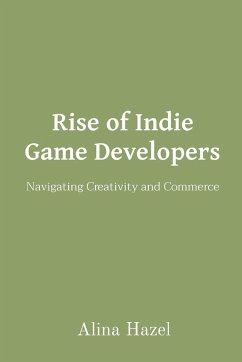As of late, there has been a significant and groundbreaking flood in the domain of computer game turn of events, set apart by the ascent of non mainstream game designers who have effectively explored the sensitive harmony among imagination and trade. This prospering development addresses a takeoff from the conventional scene overwhelmed by significant gaming studios, as little, free engineers cut out their specialties and rethink the business' elements. One of the central traits of the ascent of independent game engineers is the democratization of game advancement devices and conveyance stages. In contrast to the past, where just deeply grounded studios approached the assets expected to make and circulate games, the present non mainstream designers can use promptly accessible devices and stages to rejuvenate their dreams. This shift has opened an abundance of imaginative potential, permitting people or little groups to contend on a worldwide scale. Innovativeness lies at the core of independent game turn of events, and these designers frequently focus on imaginative articulation and one of a kind narrating over the quest for blockbuster achievement. This accentuation on imagination has brought about a different cluster of games that challenge regular standards and push the limits of the medium. Independent engineers habitually investigate specialty classifications, exploratory interactivity mechanics, and capricious accounts that may not fit the form of standard gaming yet reverberate profoundly with explicit crowds. Be that as it may, the way to progress for independent game designers isn't without its difficulties. Exploring the crossing point of imagination and business requires a fragile difficult exercise. While independent engineers might have the opportunity to seek after their imaginative dreams, they likewise face the overwhelming errand of guaranteeing their manifestations are financially feasible. Numerous engineers wind up wearing different caps - as imaginative personalities as well as business specialists, advertisers, and local area administrators. The coming of crowdfunding stages plays had a urgent impact in supporting non mainstream game designers. Stages like Kickstarter and Indiegogo give an immediate road to engineers to interface with enthusiastic networks and secure subsidizing for their ventures. This crowdfunding model engages independent engineers to keep up with imaginative control while building a committed fan base, cultivating a feeling of local area and shared excitement around their games. The ascent of computerized conveyance stages, like Steam, GOG, and itch.io, has additionally enhanced the scope of non mainstream games. Designers can now sidestep the conventional obstructions to section, contacting worldwide crowds without the requirement for actual dispersion channels. This has democratized admittance for designers as well as provided gamers with a greater and shifted choice of titles to investigate, encouraging a rich and energetic gaming environment.
Hinweis: Dieser Artikel kann nur an eine deutsche Lieferadresse ausgeliefert werden.
Hinweis: Dieser Artikel kann nur an eine deutsche Lieferadresse ausgeliefert werden.








